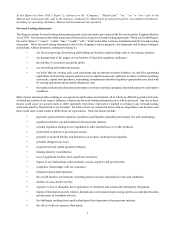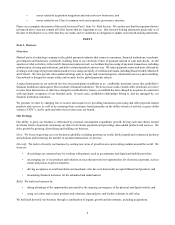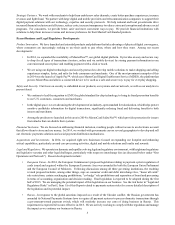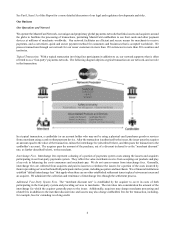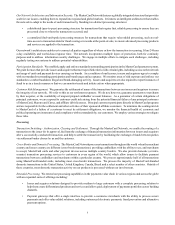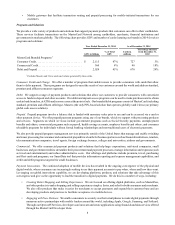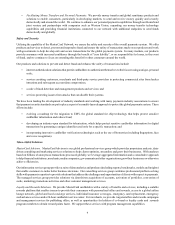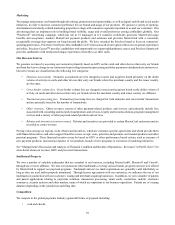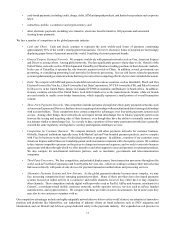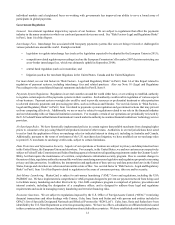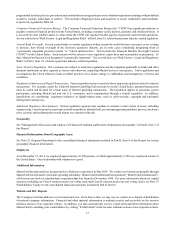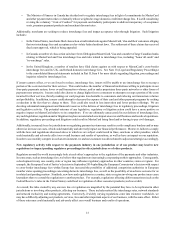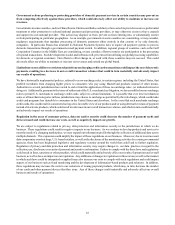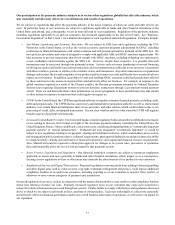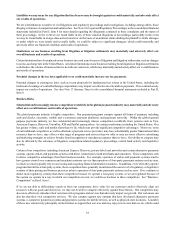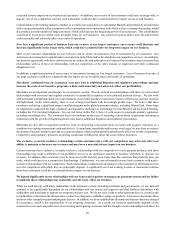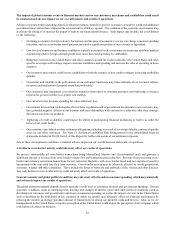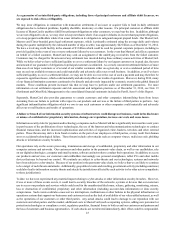MasterCard 2014 Annual Report Download - page 15
Download and view the complete annual report
Please find page 15 of the 2014 MasterCard annual report below. You can navigate through the pages in the report by either clicking on the pages listed below, or by using the keyword search tool below to find specific information within the annual report.13
program that includes policies, procedures and controls that are designed to prevent us from having business dealings with prohibited
countries, regions, individuals or entities. This includes obligating issuers and acquirers to screen cardholders and merchants,
respectively, against the SDN list.
Consumer Financial Protection Bureau. The Consumer Financial Protection Bureau (the “CFPB”) has significant authority to
regulate consumer financial products in the United States, including consumer credit, deposit, payment, and similar products. It
is not entirely clear whether and/or to what extent the CFPB will regulate broader aspects of payment card network operations.
See our risk factor in “Risk Factors - Legal and Regulatory Risks” in Part I, Item 1A related to payments industry-related regulation.
Central Bank Oversight. Several central banks or similar regulatory bodies around the world that have increased, or are seeking
to increase, their formal oversight of the electronic payments industry, are in some cases considering designating them as
“systemically important payment systems” or “critical infrastructure.” This includes the Financial Stability Oversight Council
(“FSOC”) in the United States. Such systems will be subject to new regulation, supervision and examination requirements. To
date, MasterCard has not been designated “systemically important.” See our risk factor in “Risk Factors - Legal and Regulatory
Risks” in Part I, Item 1A related to payments industry-related regulation.
Issuer Practice Regulation. Our customers are subject to numerous regulations and investigations applicable to banks and other
financial institutions in their capacity as issuers and otherwise, impacting MasterCard as a consequence. Such regulations and
investigations have been related to bank overdraft practices, fees issuers charge to cardholders and transparency of terms and
conditions.
Regulation of Internet and Digital Transactions. Various jurisdictions have enacted or have proposed regulation related to internet
transactions. For example, under the Unlawful Internet Gambling Enforcement Act in the United States, payment transactions
must be coded and blocked for certain types of Internet gambling transactions. The legislation applies to payments system
participants, including MasterCard and our U.S. customers, and is implemented through a federal regulation. In addition,
jurisdictions are considering regulatory initiatives in digital-related areas, such as cyber-security, copyright and trademark
infringement and privacy.
Additional Regulatory Developments. Various regulatory agencies also continue to examine a wide variety of issues, including
campus cards, virtual currencies, payment card add-on products, identity theft, account management guidelines, privacy, disclosure
rules, security and marketing that would impact our customers directly.
Seasonality
See “Management’s Discussion and Analysis of Financial Condition and Results of Operations-Seasonality” in Part II, Item 7 of
this Report.
Financial Information About Geographic Areas
See Note 21 (Segment Reporting) to the consolidated financial statements included in Part II, Item 8 of this Report for certain
geographic financial information.
Employees
As of December 31, 2014, we employed approximately 10,300 persons, of which approximately 5,700 were employed outside of
the United States. Our relationship with employees is good.
Additional Information
MasterCard Incorporated was incorporated as a Delaware corporation in May 2001. We conduct our business principally through
MasterCard Incorporated’s principal operating subsidiary, MasterCard International Incorporated (“MasterCard International”),
a Delaware non-stock (or membership) corporation that was formed in November 1966. For more information about our capital
structure, including our Class A common stock (our voting stock) and Class B common stock (our non-voting stock), see Note 13
(Stockholders’ Equity) to the consolidated financial statements included in Part II, Item 8.
Website and SEC Reports
The Company’s internet address is www.mastercard.com. From time to time, we may use our website as a channel of distribution
of material company information. Financial and other material information is routinely posted and accessible on the investor
relations section of our corporate website. In addition, you may automatically receive e-mail alerts and other information about
MasterCard by enrolling your e-mail address by visiting “E-Mail Alerts” in the investor relations section of our corporate website.


